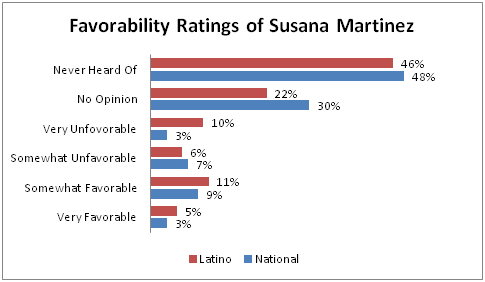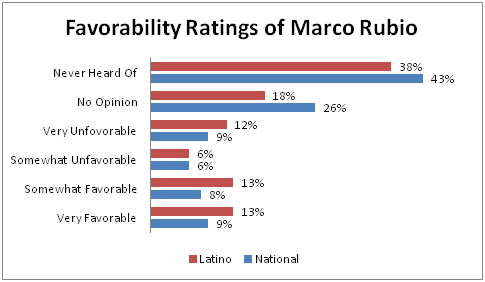One of the back stories of the GOP primary is whether any of the candidates vying to represent the Republican Party and challenge President Obama in 2012 can mobilize support among the Latino electorate. Given that Latinos are not likely to have a large impact on the outcome of the Republican primary, much of this discussion revolves around the question of whether the highly conservative stance of the Republican contenders on immigration policy will cost the GOP Latino votes in the general election? Given that the GOP candidates do not resonate well with Latino voters, it may take a game-changing event to see any of the contenders for the Republican nomination secure a meaningful percentage of the Latino vote in 2012. One potential strategy for making in-roads with the Latino electorate is to place a Latino on the ticket as a Vice Presidential candidate. But would having a Latino on the ticket actually help secure more of the Latino vote?
Through analysis of the favorability measures in the November Univision News/Latino Decisions survey for the two potential Latino GOP prospects, New Mexico Governor Susana Martinez and Florida Senator Marco Rubio, we can assess this important question. With the ability to compare the attitudes of Latino likely voters to the attitudes of non-Hispanic white likely voters, the November poll provides the ability to determine if Latino voters are more favorable toward Martinez and Rubio than non-Latino voters.
As reflected in the figure below, New Mexico’s Republican Governor Susana Martinez is not well known among the general voting population, as nearly half of the sample indicates that they have “never heard of” her, with another 30% indicating that they do not know enough about her yet to have an opinion. Furthermore, although slightly more Latinos view Governor Martinez favorably when compared to the full sample, a robust 38% have “never heard of” the first Latina to be elected governor in U.S. history. Latino voters in the Southwest are more familiar with Martinez, 34% of Latinos in this region have “never heard” of her, and 23% are either “very” or “somewhat” favorable of the Governor from New Mexico. These data suggest that Susana Martinez does not have the name recognition, at least at this point, to mobilize Latino voters if chosen as the GOP Vice Presidential candidate.

Attitudes toward Senator Marco Rubio are remarkably similar to those discussed for Martinez. As depicted in the figure below, 43% of the national electorate has “never heard of” Rubio, with another 26% yet to formulate an opinion about the Cuban American Senator. However, Rubio appears to have greater traction with Latino voters than Martinez at this point in the election season. Favorability of Rubio is higher among Latino voters than they are for Martinez (26% compared to 16%), and fewer Latinos have “never heard of” Senator Rubio. The comparative advantage for Rubio is most apparent when we look specifically at Republican identifiers within both the full and Latino samples. For example, while only 14% of Republicans in the full sample have favorable attitudes toward Martinez, a more impressive 30% of Republicans in the full sample are either “somewhat” or “very” favorable toward Rubio. There is a similar, yet more pronounced, pattern among Latino Republicans. A robust 56% of Latino Republicans are favorable toward Rubio, 40% “very” favorable, compared to only 16% who are either “somewhat” or “very” favorable toward Governor Martinez.
Senator Rubio recently visited the Southwestern city of El Paso on an official tour of the US-Mexico border to “see firsthand the challenges America faces in securing the border.” Time will tell if visits like this are at least partially geared toward establishing greater name recognition in the West, a region where Latino voters are likely to play a major role in determining the outcome of the 2012 election. However, while Marco Rubio will need to establish wider name recognition among the wider electorate to provide a spark for the GOP ticket, he appears to have the potential to mobilize Latino voters-particularly Latino Republicans.
Immigration policy will become a major talking point if either Rubio or Martinez is in fact chosen as a Vice Presidential candidate for the GOP. Both potential candidates have garnered national attention for being Latino elected officials with conservative stances on the hot-button issue, but it may be their own personal connection to immigration that will grab headlines. Rubio found himself needing to clarify the date in which his parents immigrated to the United States from Cuba, as they obtained American residency two years prior to Castro’s takeover, and not after this change in power as Rubio originally stated. Governor Martinez has also been forced to address questions about the immigration status of her family after the Santa Fe New Mexican reported that her Grandparents migrated to the United States illegally. These stories, and others yet to emerge about their personal backgrounds, are likely to become salient during the intense vetting process of the presidential election if either is considered seriously for the position of Vice President.
Although placing a Latino on the GOP ticket may in fact have a positive impact on Latino voters. Given that President Obama enjoys a nearly 50 percentage point favorability advantage over all Republican contenders among Latino voters at this point, this move may prove to be too little and too late for a party struggling to revitalize its image with the Latino electorate.
Gabriel R. Sanchez is an Associate Professor of Political Science at the University of New Mexico and Research Director for Latino Decisions.



